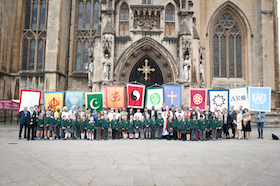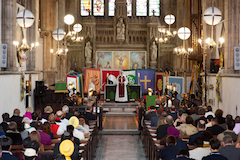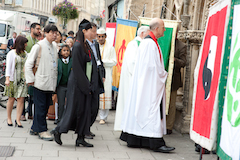| |
|
 |
Ten-year faith commitments launched at UN Faiths Meeting in Bristol
September 9, 2015:
Faith leaders pledged far reaching practical action over the next 10 years to help the world’s poorest people at a meeting with senior UN officials in Bristol, UK, to discuss the new Sustainable Development Goals (SDGs).
 |
 |
 |
Faith in the Future: Bristol UN Faiths Meeting |
The action plans, called the Bristol Commitments, were presented to Paul Ladd, Director of the United Nations Development Programme’s Post-2015 Team, at the two-day Faith in the Future meeting.
They include pledges to develop micro credit schemes for the poor, increase access to education, plant trees, invest in clean energy and green pilgrimage.
The faith leaders, who represent 24 belief traditions from around the world and belong to Buddhism, Confucianism, Christianity, Daoism, Hinduism, Islam, Judaism, Sikhism and Shintoism, also declared they would do all they could to support the new SDGs.
Faith in the Future, which runs from September 8-9, is the only scheduled meeting for the UN to discuss the SDGs with faith groups. The 17 new SDGs are aimed at lifting millions of people out of poverty and creating a more sustainable planet and will set the direction of development work worldwide for the next 15 years. They will be formally adopted on September 25 in New York.
The UN Faiths Meeting is co-hosted by ARC and UNDP and also attended by representatives from the United Nations, the World Bank, The Nature Conservancy, WWF and the Governments of France and Germany.
ARC Secretary General Martin Palmer said “The Bristol Commitments are specific, faith-related, detailed programmes of work by faith communities from around the world, each inspired by their own values and beliefs, and will make a significant contribution to improving life for millions of people around the world.
 |
 |
 |
Welcome celebration in the Lord Mayor's Chapel, Bristol |
He said sustainable development was not a new idea to the faiths: “They have been working on many aspects of the SDGs for centuries, whether that’s feeding millions of people, caring for them through schools, managing the land, or simply seeking to be a compassionate presence in a world that for many is extraordinarily tough.
“For the faiths it is very important that our contribution has been recognised, we are being asked to help and we are also being challenged to live up to our own words. The UN and national governments should know that we will work with you to deliver these goals.”
Paul Ladd, UNDP Director Post-2015 Team, said: “The world’s faith communities will play an important role in the upcoming implementation of the new agenda, mobilising people around the world to support the achievement of the 17 SDGs by 2030.
“More than 80% of the world’s people express a religious affiliation. Knowing this, it becomes clear that the UN needs to work closely with faith communities over the next 15 years if the new Global Goals for Sustainable Development are to be achieved.”
Examples of the faith commitments
Buddhist organisation, the Sarvodaya Shramadana Movement of Sri Lanka, is launching a range of initiatives to help poor people, including micro-finance, micro-credit and livelihoods support programmes.
SDG 1: End poverty in all its forms everywhere.
The Shinto of Japan are building the Great Forest Wall, a five-metre high embankment retained by sustainable forest as a buffer against future tsunamis.
SDG 11: Make cities and human settlements inclusive, safe, resilient and sustainable.
The Church of England is disinvesting from specific segments of the fossil fuel industry and companies that derive more than 10% of their revenues from the extraction of oil sands or thermal coal.
SDG 13: Take urgent action to combat climate change and its impacts.
 |
 |
 |
Procession for the Welcome Celebration |
Many faiths, including the Supreme Council of Kenya Muslims and the Church of Uganda, are training people in faith-based forms of climate-smart, sustainable agriculture such as Farming God’s Way (Christian) and Islamic Farming (Muslim).
SDG 2: End hunger, achieve food
security and improved nutrition, promote sustainable agriculture.
Many faiths, including Muslims in Uganda, the Catholic Church in Kenya and the Evangelical
Lutheran Church of Tanzania, are planting trees to restore lost forest cover.
SDG 15: Protect, restore and promote sustainable use of terrestrial ecosystems, sustainably manage forests, combat desertification and halt and reverse land degradation, and halt biodiversity loss.
Muslims in Indonesia are raising awareness among the annual 280,000 Indonesian pilgrims to Mecca to transform the Hajj into a green pilgrimage.
SDG 12: Ensure sustainable consumption and production patterns.
Led by the Bhumi Project (a worldwide Hindu response to climate change), Hindus are developing a global network of Hindu women, including businesswomen, politicians, scientists, and religious leaders, to be role models for young women and girls.
SDG 5: Achieve gender equality and empower all women and girls.
The Jesuits provide education to 175 million refugees and internally displaced people, as well as to millions of poor people. It is stepping up its work in this area.
SDG 4: Ensure inclusive and equitable education and promote lifelong learning opportunities for all.
American Quakers are working with marginalised constituencies, particularly where exclusion or oppression exist along dimensions such as ethnicity, race, gender, class, religion, sexual identity, age, physical disability, or ideology.
SDG 16: Promote peaceful and inclusive societies for sustainable development, provide access to justice for all and build effective, accountable and inclusive institutions at all levels.
Historic meeting Martin Palmer said this was an historic meeting between the UN and the major faiths: "Increasingly, international organisations, such as the UN and the World Bank, are exploring how to work in partnership with the faiths – the largest and most socially active sector of civil society in virtually every country in the world, with the exception of North Korea.
“This is why, in the new vision for development which forms the basis of the Sustainable Development Goals to be launched in late September at the UN, working with the world’s major faiths is seen as a new priority."
More information and links
For the background to how this event came about, visit: here.
The Bristol event follows the Paris Summit of Conscience for the Climate earlier this summer, which brought together major religious figures ahead of the December 2015 UN climate talks. Visit our dedicated Summit page for more information.
Download a PDF copy of this press release.
|
 |
 |
|
|
|
|
|

